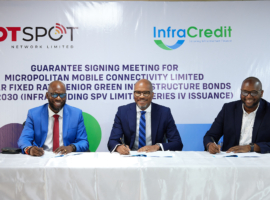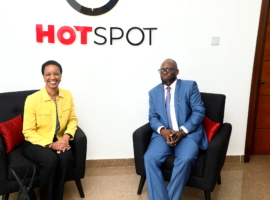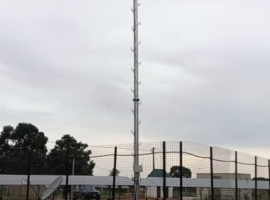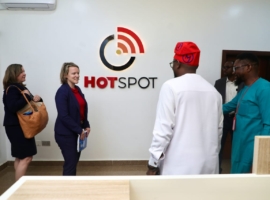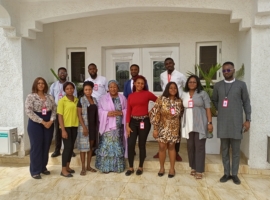HOW HOTSPOT NETWORK BUILT A PORTFOLIO OF 100 TOWERS IN NIGERIA
From billboards and BTS programmes to full co-location services
 Morenikeji Aniye is CEO of Hotspot Network Limited, a ‘middle market’ towerco with more than 100 towers in major Nigerian cities. Morenikeji, who owns 60% of Hotspot Network limited, spent 16 years in various RF Planning and Optimisation roles, including for MTN Nigeria, MTN International and Zain (now Airtel), before becoming CEO of Verreaux Technologies Limited, a diversified towerco, hybrid energy equipment and managed service provider which was the forerunner of Hotspot.
Morenikeji Aniye is CEO of Hotspot Network Limited, a ‘middle market’ towerco with more than 100 towers in major Nigerian cities. Morenikeji, who owns 60% of Hotspot Network limited, spent 16 years in various RF Planning and Optimisation roles, including for MTN Nigeria, MTN International and Zain (now Airtel), before becoming CEO of Verreaux Technologies Limited, a diversified towerco, hybrid energy equipment and managed service provider which was the forerunner of Hotspot.
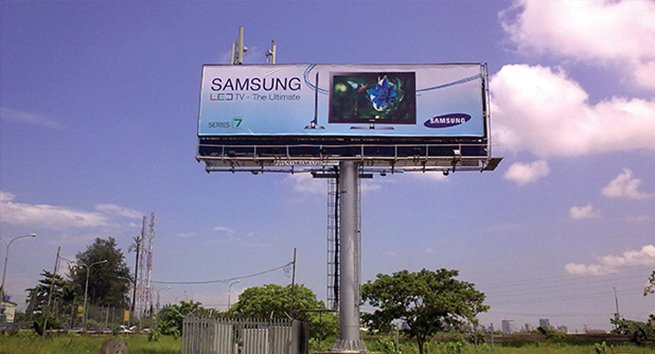
TowerXchange: Please introduce us to Hotspot Network Limited.
Morenikeji Aniye, CEO, Hotspot Network: Hotspot Network Limited is an upcoming indigenous telecommunication infrastructure sharing service provider. The company currently has a long tenure build-to-suit agreement with two major telecoms operators to make infrastructure available to them for the purpose of co-location. Hotspot is in the process of becoming a co-location service provider to a third major operator. The company built over 100 towers in the past eight months and achieved a turnover of over US$2mn within the same period. We have projected to acquire and build minimum of 250 sites in the next 12 months, growing our portfolio to about 1,000 sites in the next five years.
TowerXchange: How did Hotspot build up your initial portfolio of 100 towers?
Morenikeji Aniye, CEO, Hotspot Network: We started by building a pool of billboards through agreements with multiple vendors, enabling us to offer these billboards to RF planners on a five year lease. We have since moved into towers and monopoles. We have constructed 100 towers in high traffic areas, mainly in the big cities such as Abuja, Lagos, Port Harcourt and Kano. The towers were constructed under build-to-suit agreements with Airtel and Etisalat, but Hotspot Network owns all 100 towers.
TowerXchange: What are the typical terms for your leases? And do you offer the tower or the tower+power?
Morenikeji Aniye, CEO, Hotspot Network: For now, Hotspot leases only co-location space on our towers under 15 year agreements, renewed every 5 years. The generator, antennas and ancillaries are all owned by the MNO tenant.
TowerXchange: Tell us about the economics of running a towerco in Nigeria – how does the capital cost of a new site typically break down, and what is the ‘going rate’ for a tenancy on a Nigerian tower?
Morenikeji Aniye, CEO, Hotspot Network: The capital outlay for a new site varies according to the cost of the underling land acquisition, different permits et cetera, but an illustrative example is included in figure 1. The ‘going rate’ for a tenancy in a major metropolitan centre in Nigeria is around US$4,000pcm, inclusive of space and maintenance.
TowerXchange: Tell us about your interest in moving beyond site acquisition into managed services.
Morenikeji Aniye, CEO, Hotspot Network: In addition to acquisition of co-location sites across the country, we also want to start a full co-location service, which will include site maintenance and management, site integrated maintenance services and participation in sale and leaseback opportunities. Once we move into maintenance, we’ll outsource so we won’t have to add staff and will be able to focus on tower acquisition and co-location sales. We intend to offer site maintenance and management on our own and third party sites.
TowerXchange: Independent towercos already own over 3,000 of Nigeria’s estimated 25,000 towers. With Airtel’s Nigerian towers about to be sold, and MTN and Etisalat’s Nigerian towers up for sale, what would be the impact on your business of an estimated 18,000 additional towers transferring from Nigerian operators to other independent towercos?
Morenikeji Aniye, CEO, Hotspot Network: Hotspot Network lease rates are cheaper than our competitors and we have signed agreements with our tenants and partners, so are well positioned to deal with these challenges. By the end of 2014, over 80% of Nigeria’s towers could be owned by independent tower companies, which will limit mobile network operators’ appetite to build their own towers, which should mean more build-to-suit opportunities for companies like Hotspot.
Figure 1: Capital outlay for a new Hotspot Network tower in Nigeria
| Line item | Cost in NGN | USD equivalent* |
| Equipment | ||
| 45m 3 legged lattice tower + related ancillaries | 7,305,770 | 45,293 |
| Shelter inc entry panel air conditioning, RMS sensor, electrical reticulation and surge protection etc | 4,092,108 | 25,369 |
| RMS alarm | 232,500 | 1,441 |
| AVR / ISL (Indoor) | 1,222,950 | 7,582 |
| Battery and rectifier | 2,379,250 | 14,750 |
| Palisade fence | 866,915 | 5,371 |
| RF materials | 687,425 | 4,259 |
| 2 x 15KVA generators inc ANF and alarm panels, 5,000L diesel tank and Nepa box | 5,866,750 | 36,346 |
| Subtotal equipment | 22,653,668 | 140,344 |
| Services | ||
| Site preparation | 523,435 | 3,243 |
| Shelter installation | 218,937 | 1,356 |
| Tower works | 3,008,550 | 18,638 |
| Civil works | 2,646,935 | 16,398 |
| AC power application | 46,500 | 288 |
| Generator installation | 26,892 | 167 |
| RF services | 232,500 | 1,441 |
| Subtotal services | 6,703,750 | 41,530 |
| Additional costs | ||
| Warehousing and transportation | 434,000 | 2,689 |
| Security at site and set of locks | 179,800 | 1,114 |
| Site acquisition, permit and community issues | 8,100,000 | 50,179 |
| Total capital outlay | 38,071,218 | 235,851 |
*Exchange rate applied: US$1 = 161.3 NGN Source: Hotspot Network
TowerXchange: How is Hotspot Network financed?
Morenikeji Aniye, CEO, Hotspot Network: We started with zero capital, but our vision has brought us to this scale. Hotspot now has a credit line with a local bank, but we need to raise money through the capital markets to compete with IHS and Helios Towers Nigeria. We would also consider strategic investment from an international company interested in using Hotspot Network as a platform to enter the attractive Nigerian market. Ultimately, we’re more interested in growing the business than in owning the business.
TowerXchange: What is your vision for the future of Hotspot Network?
Morenikeji Aniye, CEO, Hotspot Network: We would like to expand Hotspot Network within Nigeria and into Ghana, Benin and Cote d’Ivoire for a more expansive West African footprint. In order to get to that scale, we are currently seeking to bring in private equity, debt or international towercos investors; we cannot do this alone, so we’re open to all positive business partnerships.
Originally published on TowerXchange.com | Click here to read

